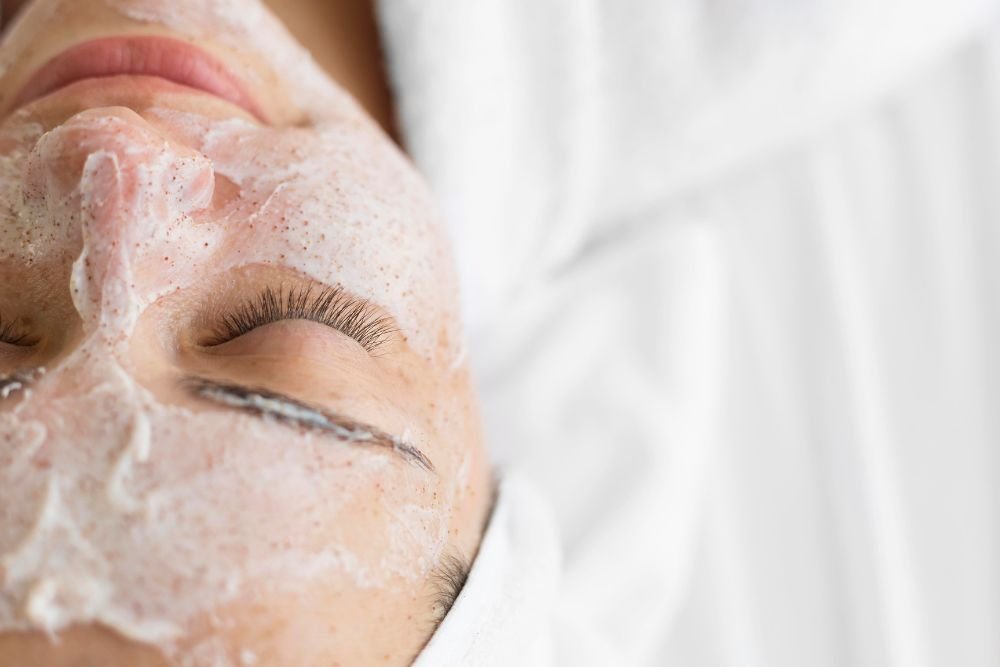Wondering how can I make my skin glow in winter? Get essential skincare, diet, and lifestyle tips to keep your skin glowing all season.
When winter arrives, it brings a sharp drop in humidity and often intense indoor heating, which can be hard on your skin.
As a result, many people experience dryness, dullness, and sensitivity, even if their skin is generally balanced in other seasons.
Fortunately, a few key adjustments can make a huge difference in keeping your skin soft, hydrated, and visibly glowing all season long.
Table of Contents
Start with a Winter-Optimized Skincare Routine
Your skincare needs often shift with the seasons, so adjusting your products and habits for winter is essential. Here’s how to do it:
Use a Gentle, Hydrating Cleanser
The cornerstone of a good skincare routine is a gentle cleanser that won’t strip your skin of its natural oils. A hydrating cleanser is key in winter because it removes impurities without causing dryness.
Opt for cleansers containing humectants like glycerin or hyaluronic acid, which pull moisture into your skin, leaving it feeling soft rather than tight after cleansing.
- Best Choices for Hydrating Cleansers: Look for creamy, non-foaming cleansers such as CeraVe Hydrating Cleanser or La Roche-Posay Toleriane Hydrating Gentle Cleanser. Both are excellent for sensitive and dry skin.
- Cleansing Tip: Avoid double-cleansing with harsh foaming agents in winter, as this can lead to over-cleansing, stripping away essential moisture.
Incorporate Regular, Gentle Exfoliation

Regular exfoliation is important in winter to remove dead skin cells that can build up and make your skin appear dull.
However, harsh exfoliants can cause more harm than good in colder months, so it’s wise to switch to gentle exfoliating products that refresh your skin without irritation.
Types of Winter-Appropriate Exfoliants:
- Chemical Exfoliants: AHAs like glycolic acid or BHAs like salicylic acid gently remove dead skin cells without the friction of physical scrubs.
- Physical Exfoliants: For those who prefer a physical scrub, choose a very soft option, like konjac sponges, which are safe for most skin types.
Exfoliation Frequency Tip: Aim for once or twice a week to prevent over-exfoliating, which can compromise your skin barrier, especially when it’s already dry and more vulnerable in winter.
Did You Know Your Skin Issues Could Be Solved with Skin Cell Turnover? Find Out How!
Prioritize Moisture-Rich Skincare Products
Choosing a Rich Moisturizer
Winter calls for a heavier, more nourishing moisturizer that creates a barrier against harsh weather and dry indoor air.
When shopping for a moisturizer, prioritize ingredients that lock in moisture and fortify your skin’s natural barrier, such as ceramides, shea butter, or squalane.
Applying moisturizer while your skin is still slightly damp helps trap water on the skin, improving hydration.
Winter-Friendly Moisturizer Recommendations:
- Cerave Moisturizing Cream: Contains ceramides and hyaluronic acid, ideal for restoring your skin’s natural barrier.
- First Aid Beauty Ultra Repair Cream: This intense hydration formula with colloidal oatmeal helps soothe dry and sensitive skin.
Add a Facial Oil for an Extra Layer of Protection
Facial oils are excellent for enhancing moisture retention, providing a healthy, winter glow. Oils like jojoba, argan, and rosehip can be layered over your moisturizer to lock in hydration.
These oils are rich in essential fatty acids that help repair the skin’s natural barrier, making them great for all skin types, especially in winter.
- Layering Tip: Apply a few drops of facial oil after moisturizer or mix them to boost your cream’s efficacy.
Boost Skin Hydration from Within Through Diet
Hydrate, Hydrate, Hydrate

In colder months, it’s easy to forget about drinking enough water, but internal hydration is just as important as topical hydration.
Keep a bottle of water with you throughout the day, aiming for at least eight glasses to support skin hydration.
Hydration Tip: Herbal teas and warm lemon water can be great alternatives to plain water in winter, keeping you hydrated while adding antioxidants.
Eat for a Healthy Glow
Diet is an often-overlooked aspect of skincare, yet nutrient-rich foods can make a significant difference in your skin’s resilience and radiance.
Focus on incorporating foods high in vitamins A, C, and E, as well as omega-3 fatty acids, to maintain healthy skin cells and combat dryness.
Winter-Friendly Nutrients for Glowing Skin:
- Vitamin A for cell repair: carrots, sweet potatoes, and leafy greens.
- Vitamin C for collagen production: oranges, strawberries, and bell peppers.
- Omega-3 fatty acids for moisture and elasticity: salmon, walnuts, and chia seeds.
Lifestyle Adjustments for Radiant Winter Skin
Maintain Indoor Humidity Levels
The air inside can become extremely dry with heating systems running all winter. This low humidity can sap your skin of moisture, leading to dryness and flakiness.
Using a humidifier in your bedroom or living space is an easy way to add moisture back into the air, keeping your skin feeling hydrated.
- Humidifier Tip: Keep humidity levels between 30-50% for optimal skin health.
Looking for a Botox Alternative? Try This 9-Ingredient Formula and Be Amazed!
Avoid Hot Showers and Baths
Hot water can feel relaxing on a cold day, but it can also strip your skin of natural oils. Instead, opt for lukewarm showers and keep them short to protect your skin’s barrier.
Shower Tips for Skin Health:
- Pat your skin dry with a soft towel and immediately apply moisturizer to lock in hydration.
- Try adding a few drops of essential oils, like lavender or chamomile, to your bath for a soothing effect without dehydrating your skin.
Additional Tips for Protecting and Hydrating Your Skin
Sunscreen Is Still Essential
It’s a common misconception that sunscreen isn’t necessary in winter, but UV rays are still present and can penetrate through clouds and reflect off snow, causing potential skin damage.
Apply a broad-spectrum sunscreen with at least SPF 30 every morning, even on overcast days.
- Sunscreen Tip: Look for sunscreens with added hydrating ingredients like hyaluronic acid or ceramides to maintain moisture while providing UV protection.
Use Hydrating Face Masks Weekly (h2)
Incorporating a hydrating mask into your routine once or twice a week gives your skin an extra boost of moisture.
Masks with ingredients like aloe vera, honey, or hyaluronic acid can provide a noticeable difference in your skin’s texture and glow.
Types of Hydrating Masks to Try:
- Sheet masks: Ideal for quick hydration.
- Overnight masks: These are left on while you sleep, providing deep hydration and repair.
Environmental Considerations for Winter Skin
Dress for the Elements
Protecting your skin from the cold requires more than skincare products—dressing appropriately can make a big difference.
Wear a scarf to shield your face from windburn, and always use gloves to protect your hands, which are particularly prone to dryness.
Avoid Harsh Ingredients
During winter, it’s best to avoid skincare products that contain drying ingredients like alcohol or synthetic fragrances.
These can strip your skin of its natural oils, exacerbating dryness and irritation.
Product Check Tip: Always read labels and opt for fragrance-free, alcohol-free products that are suitable for sensitive or dry skin types.
Conclusion: Commit to a Consistent Winter Skin Routine for Lasting Results
Winter skin care requires a bit of extra effort, but with the right routine, your skin can stay soft, glowing, and healthy all season long.
By adopting a hydrating skincare regimen, eating a balanced diet, adjusting your lifestyle, and being mindful of your environment, you can protect your skin from winter’s drying effects.
With these comprehensive tips, you’ll be well on your way to maintaining a radiant complexion through the chilliest months.

